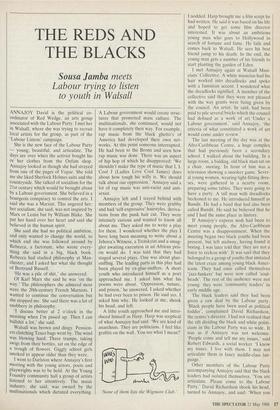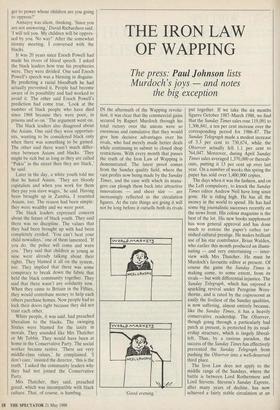THE REDS AND THE BLACKS
Sousa Jamba meets
Labour trying to listen to youth in Walsall
ANNAJOY David is the political co- ordinator of Red Wedge, an arts group associated with the Labour Party. I met her in Walsall, where she was trying to recruit local artists for the group, as part of the `Labour Listens' campaign.
She is the new face of the Labour Party — young, beautiful, and articulate. The days are over when the activist bought his or her clothes from the Oxfam shop. Annajoy looked as though she had strayed from one of the pages of Vogue. She told me she liked Sherlock Holmes suits and the countryside. She talked of socialism for the 21st century which would be brought about by a Labour government. She believed in a bourgeois conspiracy to control the arts. I said she was a Marxist. This angered her; her socialism, she said, was not inspired by Marx or Lenin but by William Blake. She put her hand over her heart and said she believed in the human spirit.
She said she had no political ambition, and only wanted to change the world, to which end she was followed around by Rebecca, a factotum, who wrote every- thing she said in a big, black book. Rebecca had studied philosophy at Man- chester, and I asked her what she thought of Bertrand Russell.
`He was a pile of shit,' she answered.
Of Karl Marx she said he was `on the way.' The philosophers she admired most were the 20th-century French Marxists. I wanted to continue the conversation but she stopped me. She said there was a lot of snobbery in philosophy.
`I discuss better at 2 o'clock in the morning when I'm pissed up. Then I can bullshit a lot,' she said.
Walsall was brown and dingy. Pension- ers clutching Tesco bags went by. The wind was blowing hard. Three tramps, taking swigs from their bottles, sat on the edge of a trough of flowers. Giggly school girls smoked to appear older than they were.
I went to Darlston where Annajoy's first meeting with the young actors, poets and playwrights was to be held. At the Young Foundry community hall a group of artists listened to her attentively. The music industry, she said, was owned by the multinationals which dictated everything. A Labour government would create struc- tures that promoted mass culture. The multinationals, she continued, would not have it completely their way. For example, rap music from the black ghetto's of America had developed their own net- works. At this point someone interrupted. He had been to the Bronx and seen how rap music was done. There was an aspect of hip hop of which he disapproved: 'We shouldn't make the type of music that L L Cool J (Ladies Love Cool James) does about how tough his willy is. We should talk about our oppression.' Annajoy said a lot of rap music was anti-racist and anti- sexist.
Annajoy left and I stayed behind with members of the group. They were grubby and had `self-expressive' hairstyles, deriva- tions from the punk hair cut. They were intensely curious and wanted to know all about me. They asked me to write a play for them. I wondered whether the play I have long been meaning to write about a Jehova's Witness, a Trotskyist and a smug- gler awaiting execution in an African pris- on would do. I was told that they had staged several plays. One was about glue- sniffing. The leading parts in this play had been played by ex-glue-sniffers. A short youth who introduced himself as a poet approached me. I asked him what his poems were about. 'Oppression, nature, and prison,' he answered. I asked whether he had ever been to prison. He said yes. I asked him why. He looked at me, shook his head, and left.
A lithe youth approached me and intro- duced himself as Harp. Harp was sceptical of what Annajoy had said. 'We are kind of anarchists. They are politicians. I feel like grafitti on the wall. You see what I mean?'
'None of them lists the Wigmore Club.' I nodded. Harp brought me a film script he had written. He said it was based on his life and hoped to get some film director interested. It was about an ambitious young man who goes to Hollywood in search of fortune and fame. He fails and comes back to Walsall. He sees his best friend jump to his death. In the end, the young man gets a number of his friends to start planting the garden of Eden.
I met Annajoy again at Walsall Musi- cians' Collective. A white musician had his hair worked into dreadlocks and spoke with a Jamaican accent. I wondered what the dreadlocks signified. A member of the collective said that they were not pleased with the way grants were being given by the council. An artist, he said, had been paid to pile several bricks which the council had defined as a work of art.'Under a Labour government,' said Annajoy, 'the criteria of what constituted a work of art would come under review.'
The last meeting of the day was at the Afro-Caribbean Centre, a huge complex that had previously been a secondary school. I walked about the building. In a large room, a balding, old black man sat on a chair, snoring. In front of him was a television showing a snooker game. Sever- al young women, wearing tight-fitting dres- ses, were gathered in a nearby room, preparing some tables. They were going to have a party. A tall man with dreadlocks beckoned to me. He introduced himself as Bandit. He had a band that had also been called Bandit. He said he believed that he and I had the same place in history.
If Annajoy's express wish had been to meet young people, the Afro-Caribbean Centre was a disappointment. When the meeting began two black youths had been present, but left midway, having found it boring. I was later told that 'they are not a force to reckon with'. It was said that they belonged to a group of youths that imitated the latest craze among young black Amer- icans. They had once called themselves 'jazz-funkers' but were now called 'soul- heads'. The rest of the audience were not young: they were 'community leaders' in early middle age.
The black leaders said they had been given a raw deal by the Labour party. 'Black people have been used as political fodder', complained David Richardson, the centre's director. I had not realised that the rift dividing the black and white politi- cians in the Labour Party was so wide. It was as if Annajoy was not welcome. 'People come and tell me my issues,' said Robert Edwards, a social worker. 'I know my issues. I live with them. I may not articulate them in fancy middle-class lan- guage.'
Other members of the Labour Party accompanying Annajoy said that the black leaders had isolated themselves. 'You are articulate. Please come to the Labour Party.' David Richardson shook his head, turned to Annajoy, and said: 'When you get to power whose children are you going to oppress?'
Annajoy was silent, thinking. 'Since you are not answering,' David Richardson said, 'I will tell you. My children will be oppres- sed by you. No way!' After the somewhat stormy meeting, I conversed with the blacks.
It was 20 years since Enoch Powell had made his rivers of blood speech. I asked the black leaders how true his prophecies were. They were divided. One said Enoch Powell's speech was a blessing in disguise. By predicting a racial bloodbath he had actually prevented it. People had become aware of its possibility and had worked to avoid it. The other said Enoch Powell's prediction had come true. 'Look at the number of black people who have died since 1968 because they were poor, in prisons and so on.' The argument went on.
The black leaders also disagreed about the Asians. One said they were opportun- ists, wanting to be considered black only when there was something to be gained. The other said there wasn't much differ- ence between Asians and blacks. 'They might be rich but as long as they are called "Pakis" in the street then they are black,' he said.
Later in the day, a white youth told me that he hated Asians. 'They are bloody capitalists and when you work for them they pay you slave wages,' he said. Having been brought up in Zambia, I resented Asians, too. The reason had been simple: they were wealthy and we were poor.
The black leaders expressed concern about the future of black youth. They said there was no discipline. The values that they had been brought up with had been completely eroded. 'You can't beat your child nowadays,' one of them lamented. 'If you do, the police will come and warn you.' They said that children as young as nine were already talking about their rights. They blamed it all on the system, too. They implied that there was some conspiracy to break down the fabric that held the black community together. They said that there wasn't any solidarity now. When they came to Britain in the Fifties, they would contribute money to help each others purchase homes. Now people had to lock their doors tight because they did not trust each other.
White people, it was said, had preached liberalism to the blacks. The swinging Sixties were blamed for the laxity in morals. They sounded like Mrs Thatcher or Mr Tebbit. They would have been at home in the Conservative Party. The social worker became restive. 'There are very middle-class values,' he complained. 'I don't care,' insisted the director, 'this is the truth.' I asked the community leaders why they had not joined the Conservative Party.
Mrs Thatcher, they said, preached greed, which was incompatible with black culture. That, of course, is humbug.































































 Previous page
Previous page